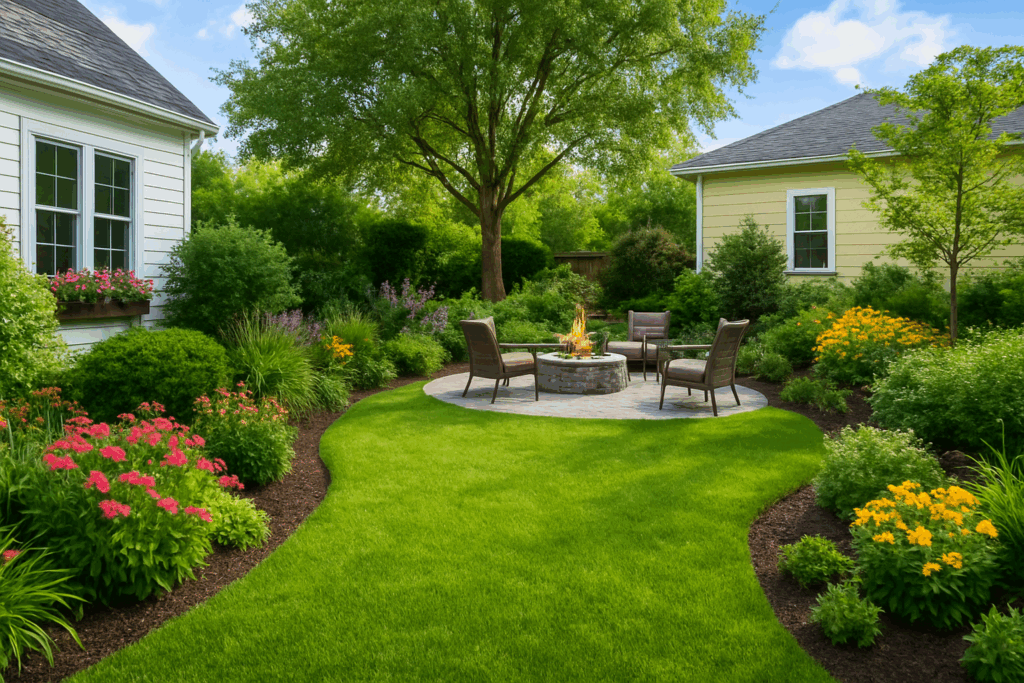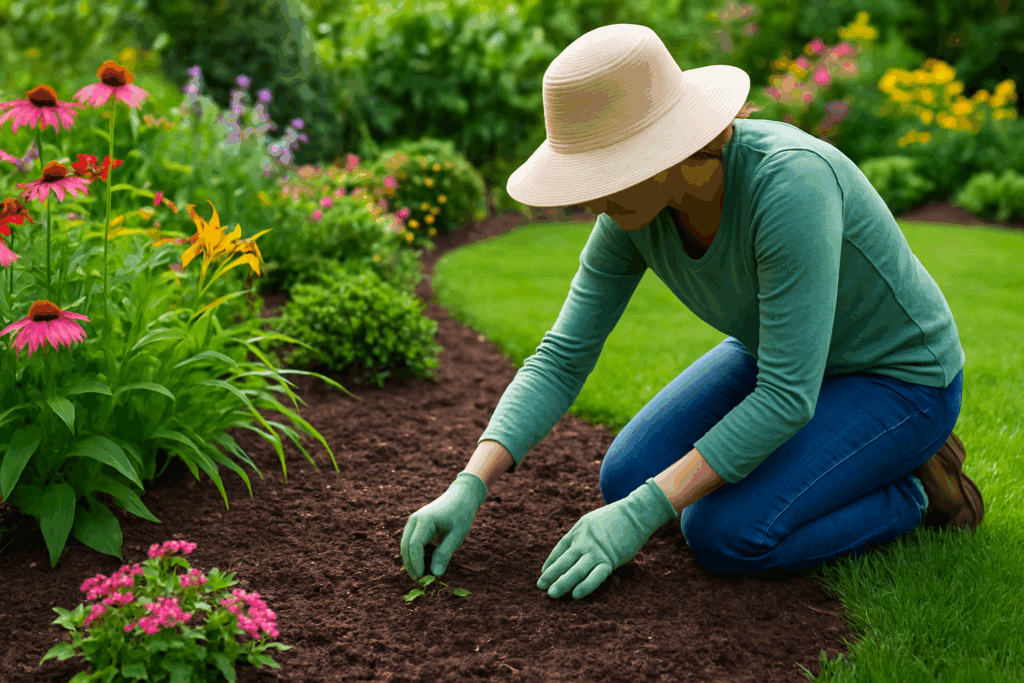Every gardener dreams of a lush, vibrant, and weed free backyard. But weeds are stubborn invaders—they steal water, nutrients, and sunlight meant for your plants. They also make your garden look messy and difficult to maintain. Luckily, you don’t need toxic chemicals or endless hours of pulling to win this battle. With the right strategies, you can keep your garden healthy, thriving, and most importantly, weed free throughout the year.
This guide covers 8 proven hacks that homeowners and gardening enthusiasts across the U.S. are using right now to enjoy stunning outdoor spaces.
1. Apply Mulch for Natural Protection
Mulching is one of the most effective and eco-friendly ways to control weeds. A 2–3 inch layer of mulch helps block sunlight, suffocating weeds before they even have a chance to grow. It also improves soil fertility, retains moisture, and adds a neat, finished look to your garden beds.
👉 Why mulch works for a weed free garden:
- Blocks sunlight from reaching weed seeds.
- Maintains cooler soil temperatures.
- Reduces water evaporation.
- Prevents soil erosion.
Best types of mulch for weed control:
- Organic mulch (wood chips, bark, straw, shredded leaves).
- Inorganic mulch (gravel, landscape stones).
2. Vinegar Spray – A DIY Weed Killer
Vinegar is a powerful natural weed killer that can eliminate unwanted growth without relying on harmful chemicals. By mixing white vinegar with a few drops of dish soap, you create a solution that clings to the weeds’ leaves, dehydrating and killing them within days.
👉 How vinegar helps in keeping your garden weed free:
- Works best on small, young weeds.
- Provides quick results.
- Non-toxic and safe for kids and pets (when used carefully).
⚠️ Tip: Vinegar is non-selective, meaning it will kill any plant it touches. Be sure to spray only on weeds, not your vegetables or flowers.
3. Boiling Water Method
For weeds growing in sidewalk cracks, pathways, or driveways, boiling water is a simple yet highly effective hack. The heat damages plant cells instantly, killing weeds down to the root.
👉 Why boiling water works:
- Immediate results.
- Free and chemical-free method.
- Perfect for hard-to-reach spots.
It’s a fast, affordable way to keep pathways weed free without damaging surrounding soil or harming pollinators.

4. Lay Down Landscape Fabric
Landscape fabric is a long-term solution for controlling weeds in flower beds, vegetable patches, and around shrubs. It acts as a barrier that prevents weeds from sprouting while still allowing air and water to reach the soil.
👉 Benefits of using fabric for a weed free yard:
- Reduces need for herbicides.
- Protects soil from erosion.
- Long-lasting weed suppression.
- Works well under mulch or decorative stones.
⚠️ Tip: Use high-quality, breathable fabric for best results. Plastic sheets may suffocate your soil and lead to drainage problems.
6. Try Solarization for Stubborn Weeds
If your garden bed is overrun with weeds, soil solarization is a game-changing hack. Cover the soil with clear plastic during the hottest months, letting the sun’s energy “cook” the soil and kill weed seeds, pathogens, and pests.
👉 Benefits of solarization:
- Effective against deeply rooted weeds.
- Improves soil health by eliminating harmful fungi.
- Provides long-term protection.
This eco-friendly hack sterilizes the soil, ensuring it stays weed free for months.
7. Install Drip Irrigation
Watering methods play a big role in weed control. Traditional sprinklers water everything in sight, including weeds. By contrast, drip irrigation delivers water directly to your plants’ roots.
👉 Why drip irrigation helps keep soil nearly weed free:
- Waters plants, not weeds.
- Conserves water.
- Reduces weed-friendly damp conditions.
- Can be automated with timers.
Installing drip irrigation not only saves water but also reduces maintenance time, making it a win-win solution for any gardener.

8. Use Ground Cover Plants
Ground cover plants are nature’s answer to weed suppression. Low-growing plants like creeping thyme, clover, or moss create a dense mat that blocks sunlight, preventing weeds from sprouting.
👉 Why ground covers promote a weed free garden:
- Compete with weeds for nutrients and space.
- Add beauty and texture to your yard.
- Provide erosion control.
- Require minimal upkeep once established.
Ground covers not only suppress weeds but also enhance the look of your landscape with color and variety.
📊 Comparison Table – Natural Weed Control Methods
| Method | Cost | Difficulty | Best For | Longevity | Weed Free Effectiveness |
|---|---|---|---|---|---|
| Mulching | Low | Easy | Flower beds, trees | 6–12 months | ⭐⭐⭐⭐ |
| Vinegar Spray | Very Low | Easy | Small weeds, garden edges | Short-term | ⭐⭐⭐ |
| Boiling Water | Free | Very Easy | Driveways, cracks, pathways | Short-term | ⭐⭐⭐ |
| Landscape Fabric | Medium | Moderate | Large beds, shrubs | 2–5 years | ⭐⭐⭐⭐ |
| Hand Pulling | Free | Laborious | All garden types | Immediate | ⭐⭐⭐⭐ |
| Solarization | Low | Moderate | Overgrown gardens | Seasonal | ⭐⭐⭐⭐ |
| Drip Irrigation | Medium | Moderate | Vegetable gardens, lawns | Long-term | ⭐⭐⭐⭐ |
| Ground Cover Plants | Medium | Easy | Borders, landscaping beds | Long-term | ⭐⭐⭐⭐ |
Conclusion
Weeds are a gardener’s worst enemy, but with the right techniques, they don’t have to ruin your outdoor space. From mulching and vinegar sprays to solarization and drip irrigation, these hacks will keep your garden healthy, attractive, and manageable.
Follow these 8 hacks consistently, and you’ll enjoy a truly weed free garden that remains vibrant, low-maintenance, and full of life all year long.
❓ Frequently Asked Questions (FAQ)
Q1: What is the fastest way to eliminate weeds naturally?
The fastest natural way is pouring boiling water directly on them or using vinegar spray. Both are chemical-free and effective.
Q2: Does mulch completely stop weeds?
Mulch significantly reduces weed growth but doesn’t eliminate them completely. A 2–3 inch layer is best for long-term suppression.
Q3: Are homemade weed killers safe for vegetable gardens?
Yes, but use carefully. Vinegar sprays are safe but non-selective, so avoid spraying directly on vegetables.
Q4: How often should I weed my garden?
Inspect weekly and remove weeds before they seed. Regular maintenance prevents them from spreading.